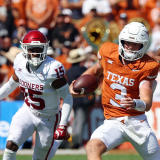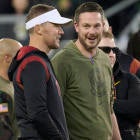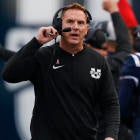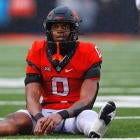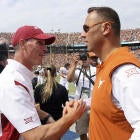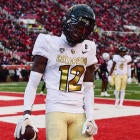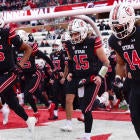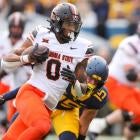
Oliver Luck has permission to speak freely.
That wasn't always the case when the NCAA's former executive vice president for regulatory affairs worked behind the scenes as sort of a fixer for the association.
It was a noble pursuit by Luck, and his absence creates a huge vacancy he transitions from essentially being the No. 2 NCAA executive to becoming the next XFL commissioner.
If Mark Emmert was the face of the much-criticized NCAA, Luck was the face of the association's credibility and respectability. (Never mind that Luck's vague corporate-created title almost requires one to find the nearest park bench to catch their breath. Think of him as the steady point guard who ran the show while Emmert continued to throw the ball out of bounds.)
Not only is he Andrew Luck's dad, Oliver's past includes stints as an NFL player and executive, lawyer, athletic director and general manager (Houston Dynamo, MLS).
So yes, his departure creates questions. The biggest: Why did Luck leave the NCAA monolith to join once-failed quasi-entertainment football start-up venture overseen by a wrestling impresario in WWE chairman Vince McMahon.
"I was convinced all the ingredients were in place to make this work," Luck said.
Trading the Commission on College Basketball for John Cena?
In this question-and-answer session, Luck speaks freely about the issues of the day.
CBS Sports: What does the NCAA look like now with legalized sports wagering in effect?
Oliver Luck: "If you're a student-athlete and you put five bucks down on an NFL game, that could cost you a year of eligibility. That's something I'm sure, at some point, our membership is going to want us to take a look at -- particularly if you're talking about casinos and racetracks. … A full season of eligibility, that's a lot [as a penalty], right? For placing a $5 or $10 dollar bet? I'm not saying that's right or wrong. The membership, at some point, is going to want us to look at the severity of that, create some sort of sliding scale or whatever."
CBS Sports: Following up, you're a pioneer in the alcohol space. (Luck instituted alcohol sales at West Virginia earlier this decade when he was AD.) What does college athletes look like with gambling and alcohol legalized in stadiums?
Luck: "The wagering thing for a lawyer is very interesting. Will there be mobile sports wagering? Will there be mobile prop betting? Conceivably, someone sitting in basketball area placing prop bets on a mobile phone while the individual is 10 feet from the court? Some of the possibilities are angst-producing. Others aren't. We had our share over the years of point-shaving cases. They seem to have diminished. We have a good bit of education about getting in hock to a bookie. … I'm not too frightened by it. It's the law of the land.
"The binge [drinking] thing was real. People [at West Virginia] really did shotgun beers right before the game started. That's not a pretty sight. … The next thing between security and cops before the game was 'Code V' (for vomit). Think about that. There is nothing worse than sitting in a ballpark and somebody is vomiting behind you. It's contrarian thinking, but I'm certainly glad to see schools do it. Some prefer not to do it, and that's fine, too."
(Editor's note: The NCAA recently decided to allow alcohol sales at its championship events. That followed a two-year pilot program during which booze was allowed at the College World Series.)
CBS Sports: The XFL has a unique opportunity here to accept players out of high school. Has that been discussed? (It is collectively bargained in the NFL that college players cannot enter the league until they are three years removed from high school.)
Luck: "We're going to build out our football department and look at issues like eligibility. That's baked into the CBA. I don't think we'll be unionized at the outset, so there will be some flexibility. We want to be very careful in terms of physical development. [There is] an underlying rationale why there has been a rule."
CBS Sports: C'mon, you guys have yet to play yet. You can speak freely. Do you have any specific thoughts on that?
Luck: "There's no question there are handful players that for whatever reason – physically, mentally -- [have an] incredible skill set who are certainly ready earlier. You think about Herschel Walker, Adrian Peterson. I'd rather get input from a lot of folks. I would support a league that would put the safety of players first. You can adhere to those high standards and still have a very robust, physical, rock 'em, sock 'em game. … If you look at what NFL did, that came from the collective bargaining agreement. In college, we sort of mandated from the top down."
CBS Sports: What are the optics of an accomplished athlete, NCAA executive and administrator going to the XFL?
Luck: "My decision to leave really doesn't indicate any displeasure with the NCAA. I love college athletics. I'm a big believer in that. This was just a really neat opportunity. It's kind of sunk in how often does one get the opportunity to build from scratch an organization. It is a very daunting challenge. You only live once. Vince is a guy who on the surface may not have a lot in common. … I'm not sure we're not all that different."
CBS Sports: Except for the AFL, every startup league that has tried to challenge the NFL has failed, including the first XFL in 2001. Why will this succeed?
Luck: "The ingredients are there that it will work. That includes a serious commitment from Vince. A lot of the other leagues were not adequately capitalized. I was over there [as an NFL Europe executive] for 10 years doing my missionary work. The NFL on Fox supported that league. It went on for 17 years. One of the things we have to do is have a certain level of patience and try to build this for the long term and build it for a sustainable way. And not get so wrapped up in Week 1 and Week 2. We have time to do it. We don't have time to rush into any decisions or market places."
CBS Sports: What are the chances the NCAA keeps looking like the way it does today? Specifically, there are external pressures from the FBI investigation, the Commission on College Basketball, calls for increased player compensation just to name a few.
Luck: "If you look down the road five years, 10 years, I see the NCAA generally looking very much like it does today. There could be some changes, certainly. Those will be more than likely coming from some third party, externally, federal courts. Even after the O'Bannon case and Judge Wilken, the cost of attendance was implemented. I'm not sure that's really changed the value of college athletes and how people view them. It's got enduring qualities. Change will be made, but I don't know if I see seismic change that we don't recognize college athletics."


